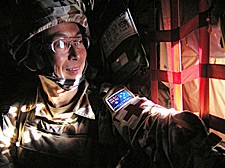 As Australians prepare to commemorate Anzac Day, a Sydney minister tells his tale of witnessing for Christ in a war torn country.
As Australians prepare to commemorate Anzac Day, a Sydney minister tells his tale of witnessing for Christ in a war torn country.
Meet Royal Australian Air Force (RAAF) Specialist Reserve chaplain, Atsushi Shibaoka. He has spent the last four months ministering in the Middle East.
From November 2005 to March 2006, the Rev Atsushi Shibaoka, senior assistant minister at St James', King St was stationed in the Middle East with a group of RAAF personnel.
Mr Shibaoka's time in the Middle East was his first deployment overseas since becoming a Defence Force Reserve Chaplain five years ago.
"My sense of chaplaincy has always been that if we are going to ask these men and women to do these difficult tasks, and face the moral dilemmas and issues of being a member of the defence force, then that's exactly where the church ought to be ministering," Mr Shibaoka says.
Mr Shibaoka says he found his chaplaincy experience in the Middle East to have a greater pastoral focus then his parish ministry.
"It's really pastoral work and more concentrated than being in a parish. You're not busy looking to get projects off the ground, running programs and enlisting volunteers for things," he says.
"It was good because you work, live and eat with the people, so there are a number of different contexts in which you get to know and communicate with them."
Mr Shibaoka first gained experience in chaplaincy work as a curate in the late 1970s in Sale, Victoria where part of his weekly program included spending Wednesdays with the Air Force Chaplain at the local base.
"It's an interesting ministry, where you come across people you wouldn't normally meet as a local church minister. You meet a good cross section of people," he says.
Mr Shibaoka says the four months allowed him develop close relationships the RAAF personnel.
"People are really generous in letting you into their personal and spiritual space" in a way far more often then a lot of people in the course of parish ministry," he says.
"You share in their different crises like relationship and parenting issues."
Upon arriving, Mr Shibaoka says he wasn't fully clear of the expectations others had of him. However, looking back at his time in the Middle East, Mr Shibaoka feels he was able to make a difference to people by getting along side them.
"People treat you like a sounding board and because they know you are a Christian minister, they give you an invitation to speak to their spiritual needs," he says.
"We certainly had conversations about faith with the people around, often late at night in the ablutions block. That's the toilets and shower block" or Cadillacs, as Americans called them," he says.
In fact, the "ablutions' block became known as Mr Shibaoka's second office.
"One day I said to the doctor, "The Cadillac is becoming my second office. I was stuck there again until midnight last night'. And soldiers used to make fun and say, "Padre is off to his second office again'," Mr Shibaoka jokes.
Mr Shibaoka says "loitering with intent' is a strategic action for chaplains.
"Chaplains hang around where people are to make themselves available for openings into conversations while being sensitive for people's needs to keep chaplains at an arms length when necessary," he says.
Mr Shibaoka says his recommendation to one unchurched man to attend an "inspirational' worship service led to the man making a commitment to Christ.
"It was an African American Pentecostal style of worship with an amazingly fantastic choir and a mixture of rap, negro spirituals and blues " just stunning," he says.
"When unchurched people approached me I would say, "Go and see what the inspirational guys do'."
"One guy went came back and said, "That was amazing. I've never come across anything like that'. About three weeks later he came back from a service and said, "Oh, I think I've made a commitment to Christ. In fact, I have'."
Mr Shibaoka says he will follow up some of the personnel he spent four months with in the Middle East when he returns to his reserve chaplain role at the Richmond RAAF base.























